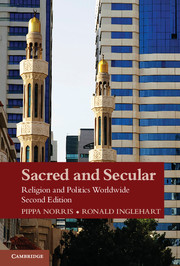Book contents
- Frontmatter
- Contents
- Tables
- Figures
- Preface and Acknowledgments
- Part I Understanding Secularization
- Part II Case Studies of Religion and Politics
- Part III The Consequences of Secularization
- Conclusions
- 10 Secularization and Its Consequences
- 11 Reexamining the Theory of Existential Security
- 12 Reexamining Evidence for the Security Thesis
- Appendix A
- Appendix B
- Appendix C
- Notes
- Bibliography
- Index
12 - Reexamining Evidence for the Security Thesis
from Conclusions
Published online by Cambridge University Press: 05 June 2012
- Frontmatter
- Contents
- Tables
- Figures
- Preface and Acknowledgments
- Part I Understanding Secularization
- Part II Case Studies of Religion and Politics
- Part III The Consequences of Secularization
- Conclusions
- 10 Secularization and Its Consequences
- 11 Reexamining the Theory of Existential Security
- 12 Reexamining Evidence for the Security Thesis
- Appendix A
- Appendix B
- Appendix C
- Notes
- Bibliography
- Index
Summary
the evidence available when the first edition of Sacred and Secular was published (2004) was insufficient to address some important conceptual and empirical issues. This chapter responds to critics of the original study, in the light of additional evidence that is now available. The first part of the chapter examines new evidence and measures that have become available since publication of the first edition, to test core claims arising from the theory. The next section focuses on claims of American “exceptionalism,” which have often been cited as potentially refuting the secularization thesis. Finally, the chapter analyzes global trends over time. We conclude that the dynamics of secularization are more complex than either the simple decline of religion that was proposed by some early sociologists or the universal resurgence of religion that has been suggested by many contemporary commentators. Instead, as we will demonstrate, the new evidence lends further support to the thesis that rising existential security tends to bring declining emphasis on religion in postindustrial societies. This – combined with the resurgence of religion in many developing and ex-Communist countries – has led to the emergence of a growing religiosity gap worldwide.
New Evidence Confirming the Link between Existential Security and Religiosity
The empirical analysis presented in the first edition of Sacred and Secular demonstrated strong correlations between religiosity and national-level indicators of economic security. But the evidence then available did not establish a direct individual-level link between religiosity and measures of existential insecurity. Consequently, one reviewer noted that: “Norris and Inglehart do not offer any evidence that the subjective experience of anxiety actually motivates religious values, relying instead on objective criteria of health and wealth.” This is a perceptive criticism. What additional evidence would provide further confirmation of the relationship between existential security and religiosity? Three sources are available. One arises from a literature review of the accumulating body of empirical research, published by other independent scholars in social psychology, healthcare, sociology, economics, and welfare studies. The results, drawing on different analytical techniques, methods, and variables, generally strengthen confidence in the security thesis. Other direct evidence comes from a new Lived Poverty Index, a measure of experiential security, constructed from the 2007 Gallup World Poll. Last, we also analyze adherence to security values, included the 2005–2007 fifth wave of the World Values Survey. Comparing the results from many independent studies strengthens the robustness of the findings, and also expands their generalizability in even more countries.
Information
- Type
- Chapter
- Information
- Sacred and SecularReligion and Politics Worldwide, pp. 253 - 282Publisher: Cambridge University PressPrint publication year: 2011
